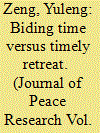| Srl | Item |
| 1 |
ID:
180195


|
|
|
|
|
| Summary/Abstract |
Trade-conflict studies focus on whether and how economic interdependence suppresses interstate conflict initiation. Meanwhile, formal theories of war show that conflict initiation is inherently tied to its termination. In this article, I seek to bridge the two literature by utilizing a war of attrition model to formalize the relationship between economic dependence and conflict duration. I theorize that the strategic calculation ultimately comes down to a trade-off between biding one’s time and retreating in a timely manner. In the context of economic attrition, states weigh the relative costs of suffering an additional round of economic disruption against the potential benefits of winning the disputed good. As such, economic dependence can have both coercive and informational effects and these effects are contingent upon issue salience. When the issue salience is low, the coercive effect dominates; states are more likely to quit conflicts as they suffer proportionally larger economic costs. When the issue salience is high enough, the informational effect can kick in; states are less likely to quit conflicts with increasing economic costs. I test these implications on the International Crisis Behavior (ICB) and the Militarized Interstate Dispute (MID) data, finding strong support for the informational effect and suggestive evidence for the coercive one.
|
|
|
|
|
|
|
|
|
|
|
|
|
|
|
|
| 2 |
ID:
100391


|
|
|
|
|
| Publication |
2010.
|
| Summary/Abstract |
When are economic sanctions expected to succeed? Previous studies predict that sanctions will be more effective when the issue at stake is important, when the sender and target are allied, when the target's domestic institutions are more democratic, and when the target's economy is dependent on the sender's. This article subjects these explanations to an empirical test using a new fully structural estimation that employs a game theoretic model as a statistical model. The initiation and outcomes of sanctions are incorporated with the strategic behaviors of sender and target states into a unified model. The model improves upon extant models by allowing the initial choice of the sender states to be multiple, not binary. This non-binary option enables the sender states to opt for the optimal intensity level of sanctions. Findings suggest that issue salience is positively associated with the decision to impose sanctions, but not necessarily with their effectiveness. Further, allied targets tend to comply even when they can win a sanctions contest, while non-allied targets tend to resist even when they know that on average the sender is likely to continue sanctioning in the face of resistance. Since sanctions imposed from 1903 to 2002 take place disproportionately between non-allied dyads, and thus belong to the category of sanctions most likely to fail, we can begin to understand why sanctions have such a low success rate.
|
|
|
|
|
|
|
|
|
|
|
|
|
|
|
|
| 3 |
ID:
123570


|
|
|
|
|
| Publication |
2013.
|
| Summary/Abstract |
This article asks why the Government of Poland participated in the invasion of Iraq in March 2003 when a large majority of the Polish public was opposed to national involvement in Iraq. The aim is to further an understanding of the circumstances under which democratic governments ignore public opinion in their foreign policy decision-making. The article argues that a combination of three circumstances increased the willingness of the government to ignore the public. First, the Iraq issue had relatively low salience among the Polish voters, which decreased the domestic political risks of pursuing the policy. Second, the government's Iraq policy was supported by a considerable consensus among the political elite. Third, the political elites were unified in their perceptions that participating in the invasion would yield essential international gains for Poland.
|
|
|
|
|
|
|
|
|
|
|
|
|
|
|
|